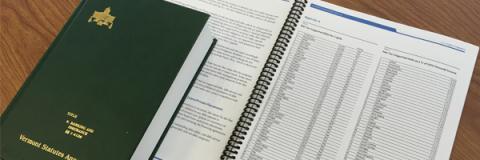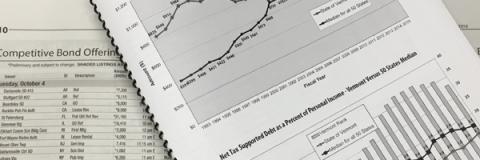The Office of the State Treasurer is responsible for the issuance and management of the State of Vermont's debt in a prudent and cost-effective manner. The State Treasury issues long-term debt consistent with authorization by the legislature. The full faith and credit of the State is pledged to the payment of the State's general obligation bonds.
General Obligation Bonds
General Obligation bonds are used for numerous purposes including construction and renovation of state office buildings and state recreational, cultural, health, correctional and educational facilities; making grants to municipalities for the purposes of funding wastewater and drinking water facilities upgrades;  transportation projects funding (recent); and for other capital projects.
transportation projects funding (recent); and for other capital projects.
The Treasurer also is authorized to issue short-term notes for the purpose of raising funds to pay the expenses of government for which appropriations have been made but for which anticipated revenues have not been received, and other proposed uses outlined by statute. These can take the form of Revenue Anticipation Notes (RANs), Bond Anticipation Notes (BANs), commercial paper, or other related borrowing instruments.
The Treasurer may issue general obligation refunding bonds. In a refunding situation, new bonds are issued to retire existing bonds in order to take advantage of lower interest rates. Issuing bonds in order to pay off earlier bonds prior to their maturity dates is called advance refunding.
Transportation Infrastructure Bonds
The State also sells Special Obligation Transportation Infrastructure Bonds to pay for the rehabilitation, reconstruction or replacement of State and municipal bridges, culverts and roads, and State railroads, airports and necessary buildings with a remaining useful life of 30 years. These bonds are not full faith and credit obligations of the State, but rather are repaid from motor fuel transportation infrastructure assessments of $0.03 per gallon of diesel fuel and two percent of the retail price of each gallon of motor fuel.
Upcoming Bond Issues
General Obligation Bonds usually are sold once per year in autumn and Transportation Infrastructure Bonds typically are sold once per year (as needed) in the summer. For its General Obligation Bonds, the State typically offers approximately one-third of the bonds on a negotiated basis as "Vermont Citizen Bonds" with priority given to Vermont retail investors, with the remaining two-thirds of the bonds sold on a competitive basis to institutional buyers. The State typically sells its Transportation Infrastructure Bonds on a competitive basis to institutional buyers. If interest rates are low enough, the State may also offer an additional amount of “refunding” bonds to refinance existing bonds. Information on the State's next bond sale can be found by going to our Bond Issues web page.





